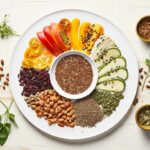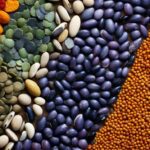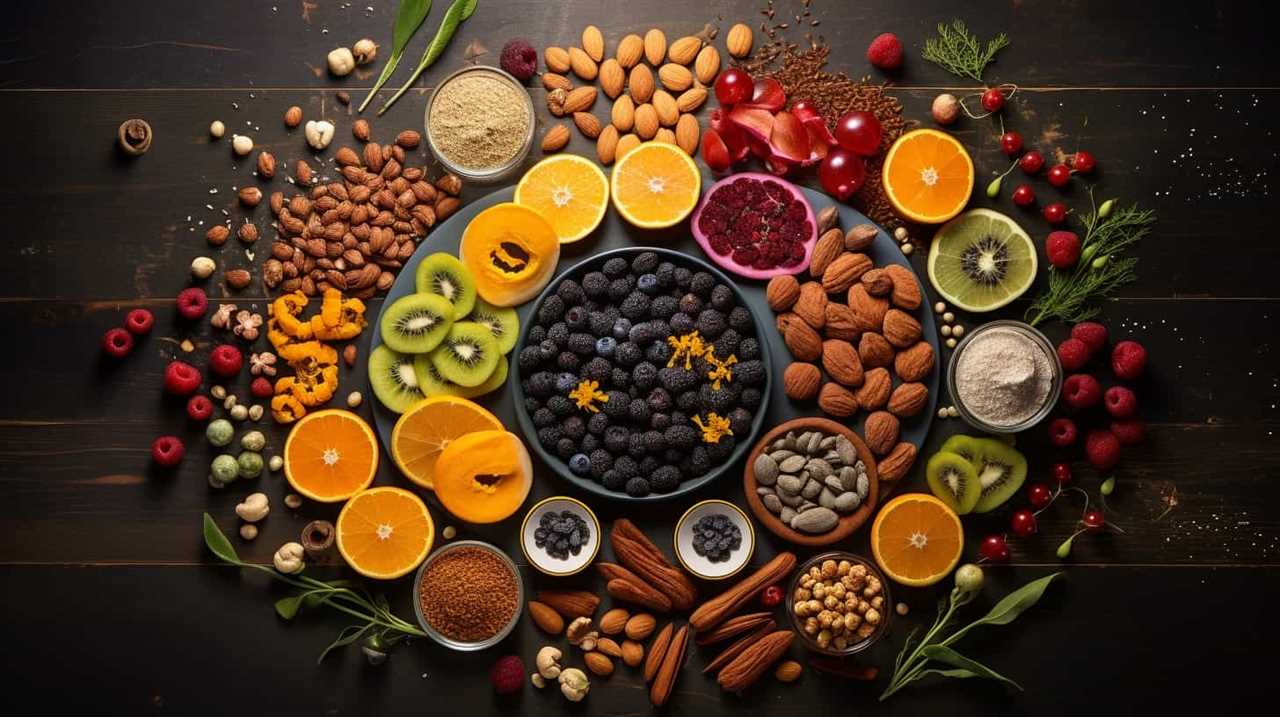Explore 10 creative ways to incorporate chia seeds into your gluten-free baked goods! Whether you’re looking to boost nutrition, replace dairy, or improve texture, chia seeds are a versatile ingredient.
From chia gel to chia sprinkles, these tiny powerhouses can add moisture, flavor, and texture to your favorite baked goods.
So, grab your apron and get ready to elevate your gluten-free recipes with these chia seed hacks!
Key Takeaways
- Chia seed flour and chia eggs are versatile ingredients that can be used in various gluten-free baking recipes, providing nutritional benefits such as fiber and omega-3 fatty acids.
- Chia gel and chia pudding can be used as substitutes for eggs or oil in recipes, adding moisture and enhancing the nutritional value of baked goods.
- Chia seeds themselves are a nutritional boost in gluten-free recipes, offering fiber, omega-3 fatty acids, antioxidants, calcium, and magnesium.
- Chia jam, chia water, chia sprinkles, and chia seed butter are additional ways to incorporate chia seeds into gluten-free baking, adding flavor, texture, and visual appeal to baked goods.
Chia Seed Flour in Gluten-Free Baking
One way we can incorporate chia seeds into gluten-free baking is by using chia seed flour. Chia seed flour is a versatile ingredient that can be used to make a variety of delicious and nutritious baked goods.
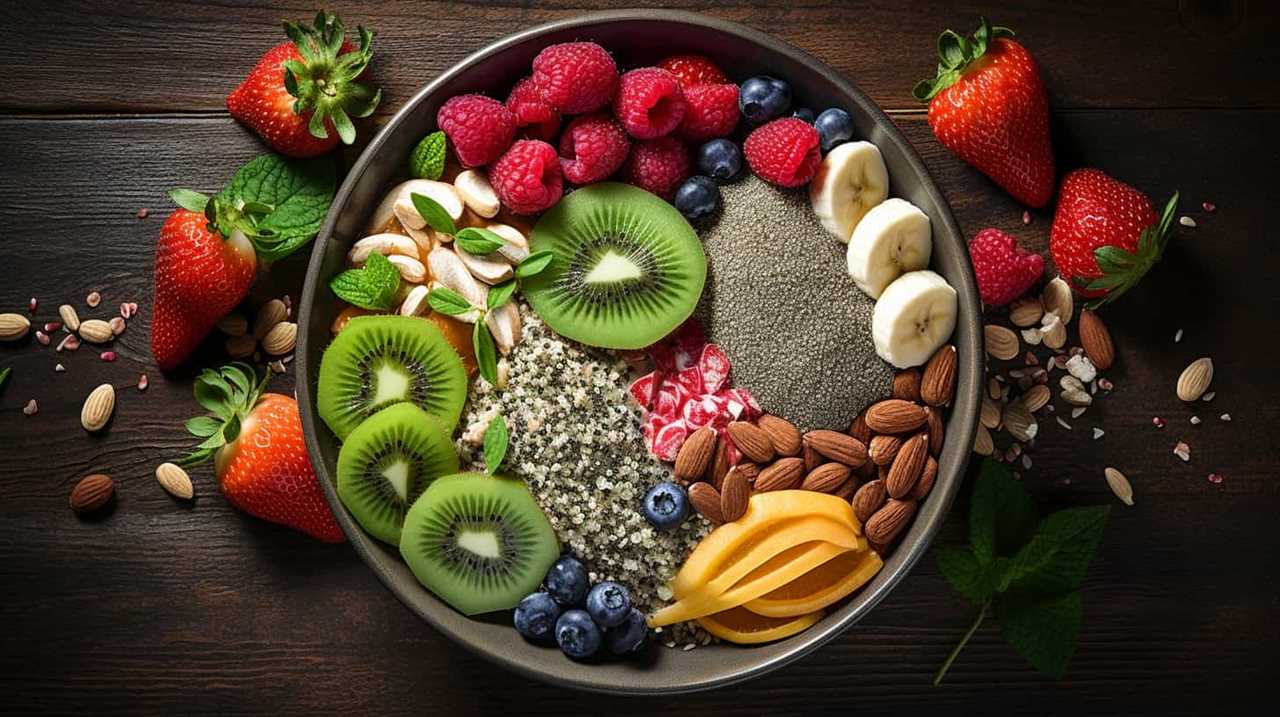
For example, you can use chia seed flour to make fluffy and flavorful chia seed pancakes. Simply replace a portion of the regular flour in your pancake recipe with chia seed flour for an added boost of fiber and omega-3 fatty acids.
Chia seed flour can also be used to make moist and tender chia seed muffins. Just substitute some of the all-purpose flour with chia seed flour to enhance the nutritional content of your muffins.
By incorporating chia seed flour into your gluten-free baking, you can enjoy the benefits of chia seeds while still indulging in your favorite treats.
Now, let’s explore another way to incorporate chia seeds into baked goods by using chia egg replacements.
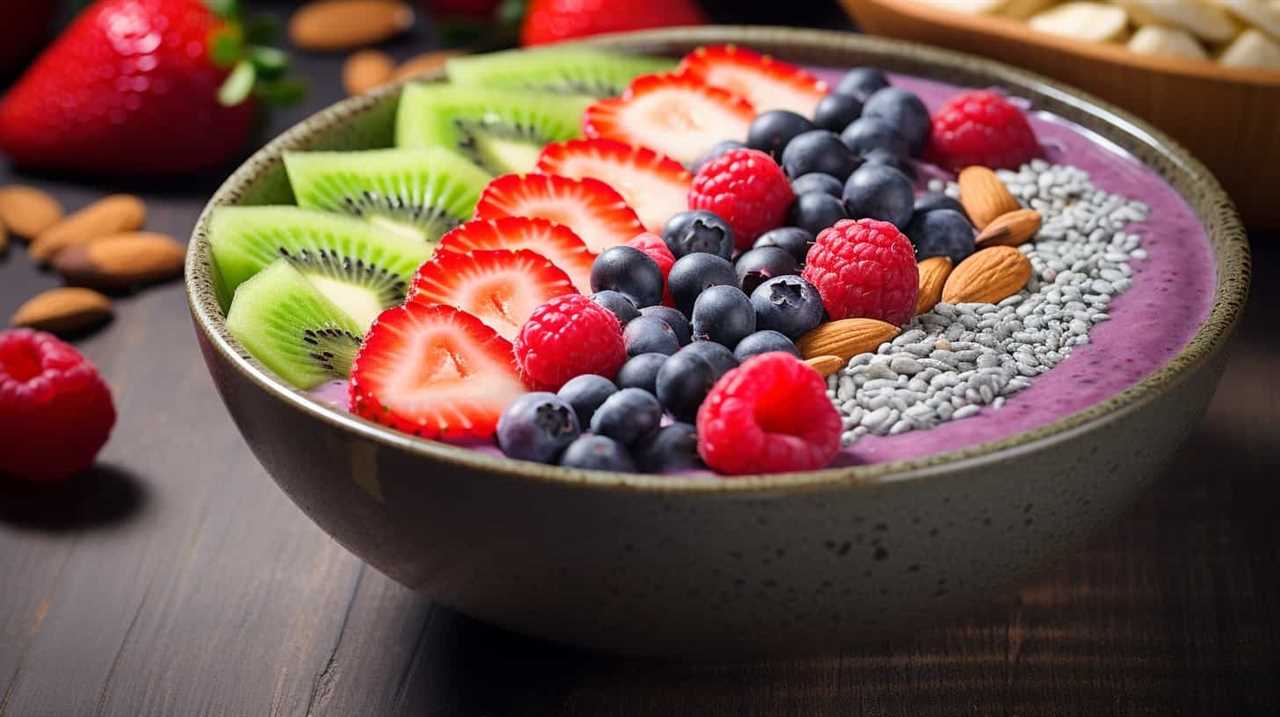
Chia Egg Replacements in Baked Goods
To continue incorporating chia seeds into gluten-free baking, let’s explore the use of chia egg replacements in our baked goods. Chia eggs are a simple and nutritious alternative to traditional eggs, providing a variety of benefits.
Here are some reasons to consider using chia eggs in your baking:
- Chia seeds are rich in omega-3 fatty acids, providing heart-healthy benefits.
- They’re packed with fiber, promoting digestive health and aiding in weight management.
- Chia eggs are a great source of plant-based protein, making them suitable for vegans and vegetarians.
- They add moisture to baked goods, resulting in a soft and tender texture.
- Chia eggs are easy to make by combining chia seeds with water and allowing them to gel.
Now that we understand the benefits of chia eggs, let’s explore some delicious chia seed recipes for your gluten-free baking endeavors.
Chia Gel as a Binding Agent in Recipes
Now, let’s delve into the use of chia gel as a binding agent in our gluten-free baking recipes. Chia gel is made by combining chia seeds with water and allowing them to sit for about 15 minutes until they form a gel-like consistency. This gel can then be used as a substitute for eggs or other binding agents in baking.
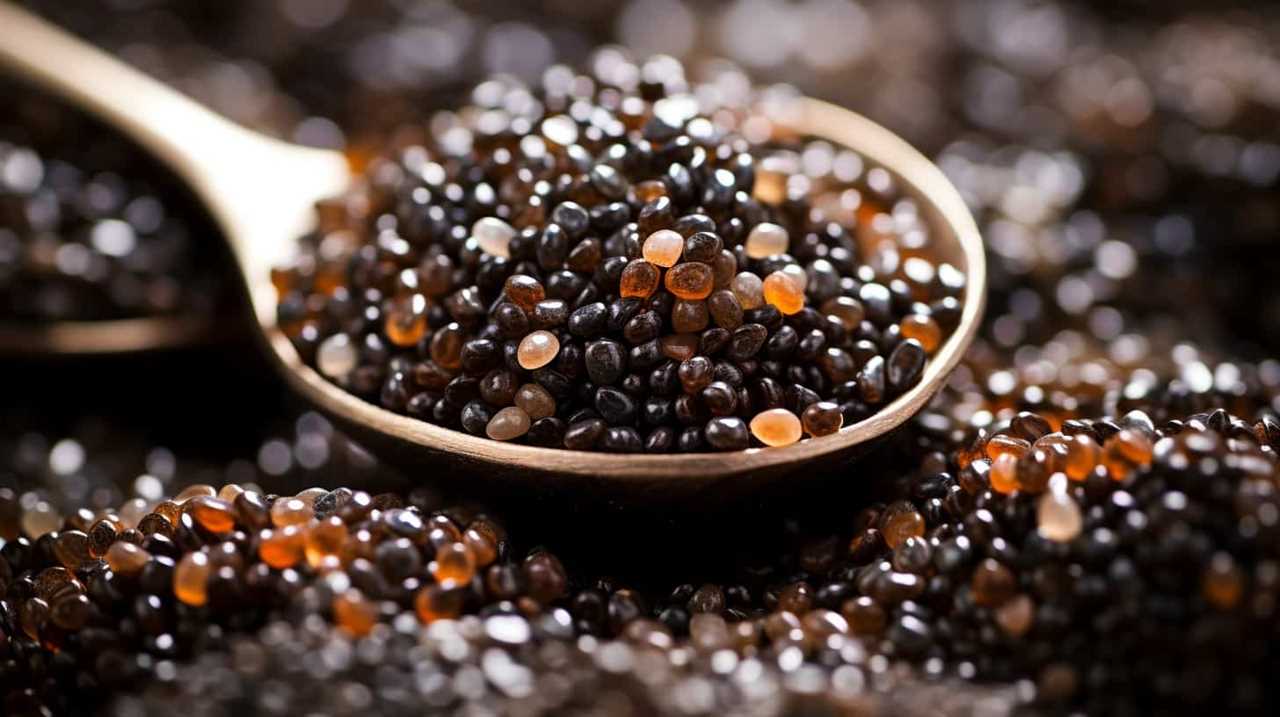
Using chia gel in recipes offers several benefits. Firstly, it helps to bind the ingredients together, ensuring that your baked goods hold their shape. Secondly, it adds moisture to the recipe, resulting in a moist and tender texture. Lastly, chia gel contributes to the nutritional value of your baked goods, as chia seeds are rich in fiber, protein, and omega-3 fatty acids.
Now that we understand the benefits of using chia gel in baking, let’s explore another way to incorporate chia seeds into our gluten-free creations: chia pudding for moist and flavorful baked goods.
Chia Pudding for Moist and Flavorful Baked Goods
As we continue exploring ways to incorporate chia seeds into gluten-free baking, let’s now delve into the use of chia pudding for moist and flavorful baked goods. Chia pudding, made by combining chia seeds with a liquid like milk or yogurt, can be used as a substitute for eggs or oil in recipes.
Here are five reasons why chia pudding is a great addition to your gluten-free baking:
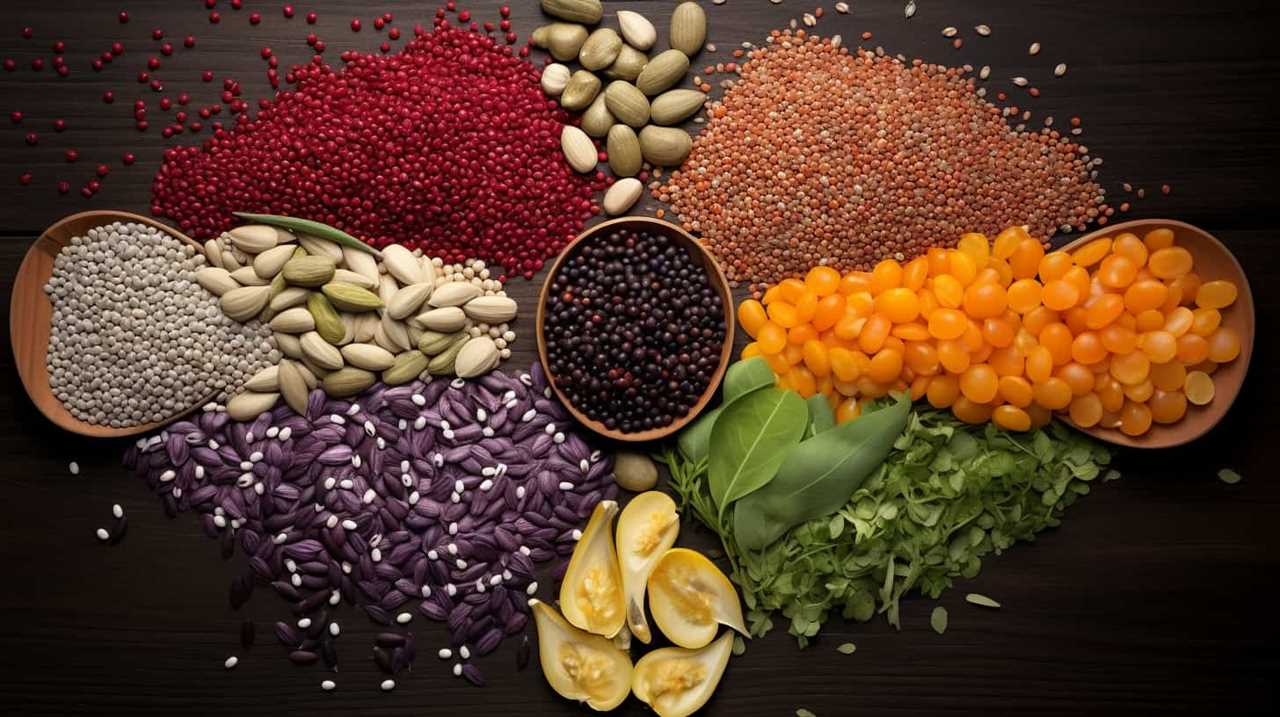
- Provides moisture: Chia pudding adds moisture to baked goods, keeping them from becoming dry and crumbly.
- Enhances flavor: The nutty taste of chia seeds adds depth and richness to your baked goods.
- Adds nutritional value: Chia seeds are packed with fiber, protein, and omega-3 fatty acids, making your baked goods more nutritious.
- Versatile ingredient: Chia pudding can be used in a variety of recipes, from chia seed smoothies to chia seed pancakes.
- Gluten-free and vegan: Chia pudding is naturally gluten-free and vegan, making it a suitable option for those with dietary restrictions.
Chia Seeds as a Nutritional Boost in Gluten-Free Recipes
Exploring the nutritional benefits of chia seeds in gluten-free recipes, we can incorporate them as a powerful boost to enhance the overall nutritional value of our baked goods. Chia seeds aren’t only versatile in baking, but they can also be used as a smoothie ingredient, providing an extra dose of nutrition.
Rich in fiber, chia seeds promote healthy digestion and can be beneficial for gut health. They’re also packed with omega-3 fatty acids, antioxidants, and minerals such as calcium and magnesium. These nutrients contribute to reducing inflammation, supporting heart health, and improving brain function.
Chia Jam as a Topping or Filling in Baked Goods
When it comes to adding flavor and texture to baked goods, chia jam can be a versatile and nutritious choice. Whether you prefer a sweet or savory taste, chia jam can be easily customized to suit your preferences.
Additionally, chia seeds are packed with health benefits, including omega-3 fatty acids and fiber.
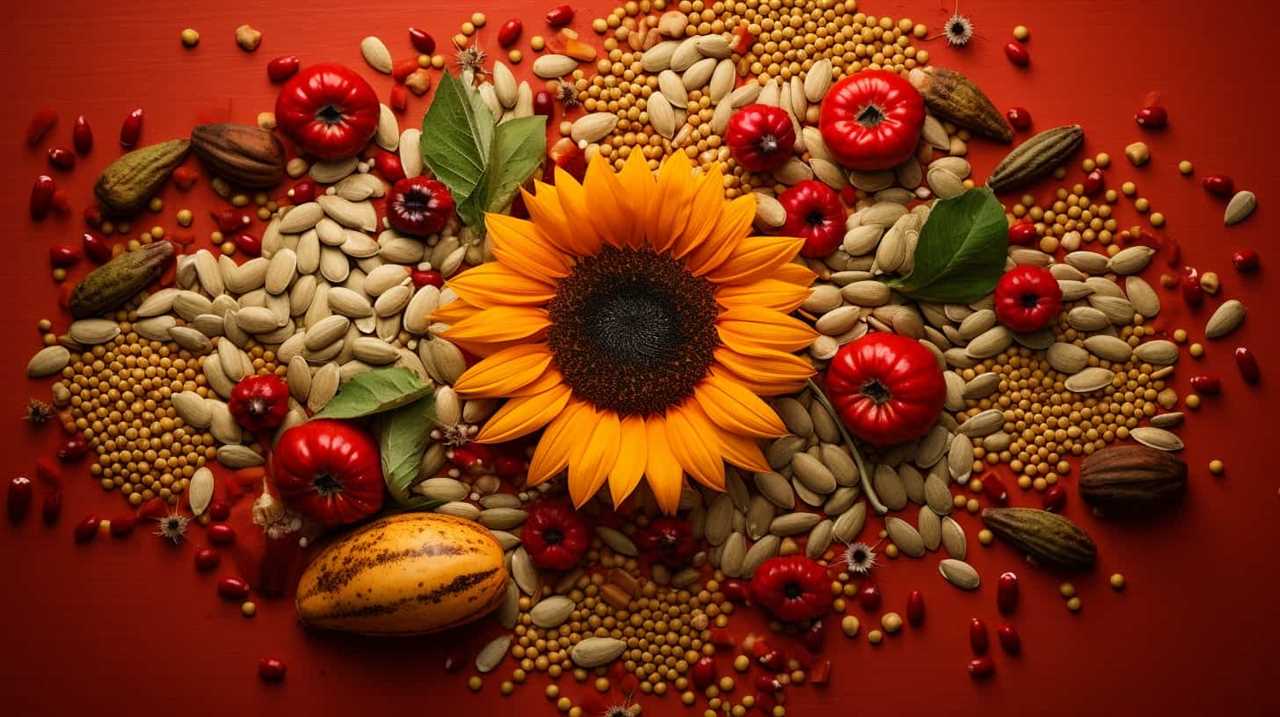
With these recipe ideas for chia jam, you can elevate your gluten-free baking to a whole new level.
Sweet or Savory
To incorporate chia seeds into gluten-free baking, we love using chia jam as a delicious topping or filling in our baked goods. Chia jam is a versatile and healthy option that can add a burst of flavor to both sweet and savory recipes. Here are five ways to incorporate chia jam into your gluten-free baking:
- Spread chia jam on top of gluten-free toast for a sweet and fruity breakfast delight.
- Use chia jam as a filling in gluten-free thumbprint cookies for a burst of flavor in every bite.
- Swirl chia jam into gluten-free muffin batter for a delightful surprise in each muffin.
- Layer chia jam between gluten-free cake layers for a fruity and moist cake.
- Mix chia jam into gluten-free bread dough for a sweet or savory twist on traditional bread.
Health Benefits of Chia
Chia jam offers numerous health benefits when used as a topping or filling in baked goods. Chia seeds are packed with nutrients that can support weight loss and aid digestion. These tiny seeds are rich in fiber, which helps to keep you feeling full and satisfied, making them a great addition to a weight loss diet. Additionally, chia seeds contain omega-3 fatty acids, which can help reduce inflammation and improve digestion. When used in jam, chia seeds can add a thick and jelly-like texture, providing a healthier alternative to traditional jams that are often high in added sugars. By incorporating chia jam into your baked goods, you can enjoy the health benefits of chia seeds while still satisfying your sweet tooth.
Here is a table summarizing the health benefits of chia seeds for weight loss and digestion:

| Health Benefits | Chia Seeds for Weight Loss | Chia Seeds for Digestion |
|---|---|---|
| High in Fiber | Helps promote satiety and prevent overeating | Supports regular bowel movements |
| Omega-3 Fatty Acids | May help reduce inflammation and improve metabolism | Supports gut health and reduces bloating |
| Low in Calories | Can be a part of a calorie-controlled diet | Does not contribute to excessive calorie intake |
Incorporating chia jam into your gluten-free baking allows you to enjoy these health benefits while adding flavor and texture to your favorite treats.
Recipe Ideas for Chia Jam
How can we incorporate chia jam as a topping or filling in our gluten-free baked goods? Chia jam is a versatile and delicious addition to any recipe. Here are some creative uses for chia jam in baking:
- Spread it on top of gluten-free toast for a sweet and tangy breakfast treat.
- Use it as a filling in your favorite gluten-free cupcakes or muffins for an added burst of flavor.
- Swirl it into your gluten-free cheesecake batter for a beautiful marbled effect.
- Dollop it onto your gluten-free pancakes or waffles for a burst of fruity goodness.
- Fill gluten-free thumbprint cookies with chia jam for a delightful and colorful surprise.
These ideas won’t only enhance the taste of your gluten-free baked goods, but also add a nutritious touch with the chia seeds.
Now, let’s explore another way to incorporate chia into gluten-free baking – chia water as a hydration booster.

Chia Water as a Hydration Booster in Gluten-Free Baking
When it comes to gluten-free baking, hydration is key to achieving a moist and tender texture. That’s where chia water comes in.
By soaking chia seeds in water, they form a gel-like substance that can be used as a hydration booster in gluten-free baking.
This not only helps to keep your baked goods from drying out, but it also adds nutritional benefits such as fiber and omega-3 fatty acids.
Benefits of Chia Water
Using chia water as a hydration booster in gluten-free baking can significantly enhance the moisture and texture of the final products. Chia water is made by soaking chia seeds in water, allowing them to absorb the liquid and form a gel-like consistency. This gel acts as a binding agent and helps to retain moisture, resulting in baked goods that are moist and tender.

Here are some benefits of using chia water in gluten-free baking:
- Improved texture: Chia water helps to create a softer and more tender texture in gluten-free baked goods.
- Increased moisture: The gel-like consistency of chia water helps to keep baked goods moist, preventing them from drying out.
- Enhanced nutritional value: Chia seeds are packed with nutrients like omega-3 fatty acids, fiber, and antioxidants, adding a nutritional boost to your baked goods.
- Egg replacement: Chia water can be used as an egg substitute in vegan baking, making it a versatile ingredient.
- Longer shelf life: Baked goods made with chia water tend to have a longer shelf life, staying fresh for a longer time.
Improved Texture in Baking
To achieve improved texture in gluten-free baking, we incorporate chia water as a hydration booster. Chia seeds have the unique ability to absorb water and form a gel-like substance. When this gel is added to gluten-free recipes, it helps to bind the ingredients together and create a smoother, more cohesive texture. The chia water also adds moisture to the baked goods, preventing them from becoming dry and crumbly.
One recipe idea to try is using chia water in gluten-free bread. Simply mix 1 tablespoon of chia seeds with 3 tablespoons of water and let it sit for 15 minutes until it forms a gel. Then, incorporate the gel into your bread dough to add moisture and improve the texture.
Another option is using chia water in gluten-free muffins or cookies. It can be added to the batter or dough to enhance the texture and make them more enjoyable to eat.
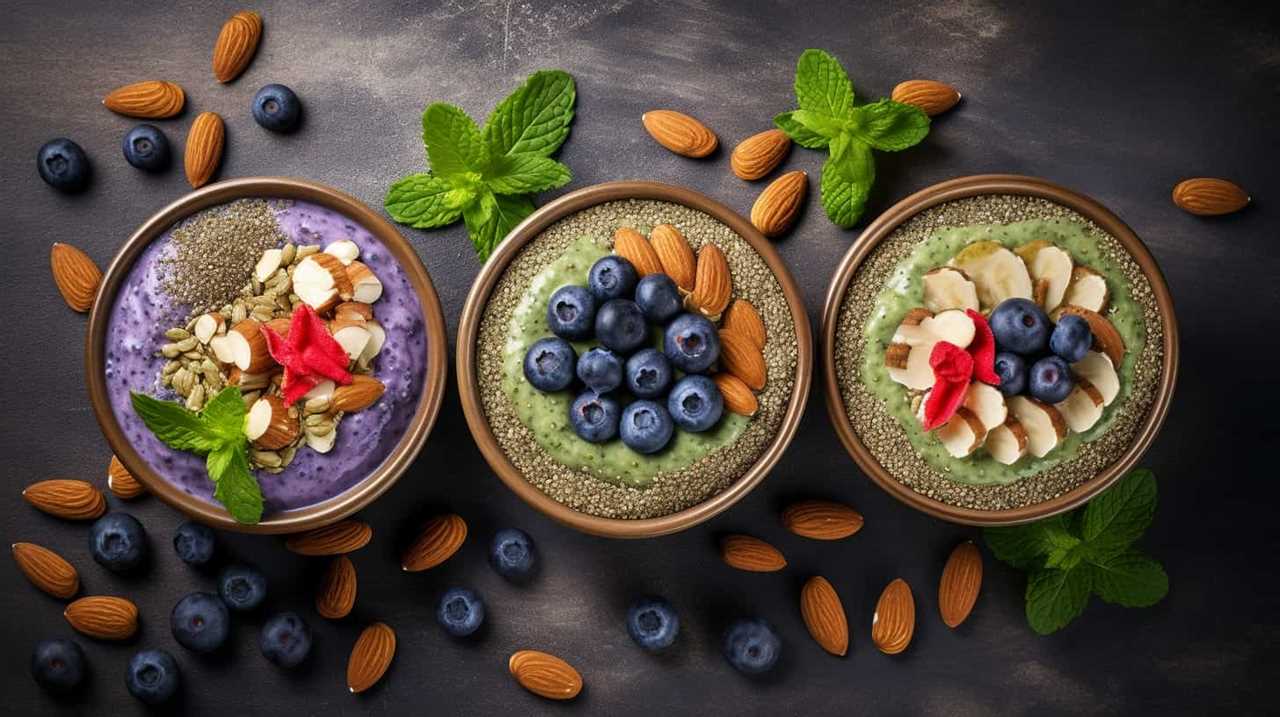
Chia Sprinkles for Added Texture and Crunch in Baked Goods
We love adding chia sprinkles to our gluten-free baked goods for an extra touch of texture and crunch. Chia seeds are a versatile ingredient that can be used in various ways, and incorporating them as sprinkles is a great way to elevate your baked goods. Here are some reasons why we love using chia sprinkles:
- Adds a delightful crunch: Chia seeds have a unique texture that adds a satisfying crunch to your baked goods.
- Boosts nutritional value: Chia seeds are packed with essential nutrients like fiber, protein, and omega-3 fatty acids, making your treats healthier.
- Enhances visual appeal: The tiny black chia seeds create an eye-catching contrast against lighter baked goods, making them visually appealing.
- Provides a burst of flavor: Chia seeds have a mild, nutty flavor that complements a wide range of baked goods, adding an extra layer of taste.
- Easy to incorporate: Simply sprinkle chia seeds on top of your batter or dough before baking for an effortless addition of texture and crunch.
Chia Seed Butter as a Dairy-Free Alternative in Baking
When it comes to baking, many individuals are looking for dairy-free alternatives. Chia seed butter is a great option that can be used in place of traditional dairy butter. Not only does it provide a creamy texture and rich flavor, but it also offers numerous health benefits such as omega-3 fatty acids and fiber.
Incorporating chia seed butter into your baking recipes can be a delicious and nutritious way to cater to those with dairy allergies or dietary restrictions.
Chia Vs Dairy in Baking
Although chia seeds don’t contain dairy, they can be used as a dairy-free alternative in baking by making chia seed butter. Chia seeds are incredibly versatile and can be used in various ways in recipes. Here are some reasons why chia seed butter is a great dairy-free alternative:

- Chia seeds are rich in omega-3 fatty acids, which support heart health and reduce inflammation.
- They’re packed with fiber, which aids digestion and promotes a feeling of fullness.
- Chia seed butter adds a creamy texture and nutty flavor to baked goods.
- It can be used as a substitute for butter or oil in recipes, making it a healthier option.
- Chia seed butter is easy to make at home and can be stored for later use.
Benefits of Chia Butter
Continuing from the previous subtopic, let’s delve into the benefits of incorporating chia seed butter as a dairy-free alternative in baking. Chia butter, made from ground chia seeds and oil, offers a range of advantages for those looking to avoid dairy products.
One of the key benefits of chia butter is its high omega-3 fatty acid content. Omega-3s are essential for brain health and can help reduce inflammation in the body. Chia butter is also a good source of fiber, which aids digestion and helps maintain a healthy weight.
Moreover, chia butter adds a creamy and nutty flavor to baked goods, making it an excellent ingredient for cookies, muffins, and cakes. It can be used as a one-to-one replacement for dairy butter in most recipes, providing a dairy-free alternative that is rich in nutrients and adds a unique taste to your baked treats.
Here are some chia butter recipe ideas to get you started:

| Recipe | Ingredients |
|---|---|
| Chia Butter Chocolate Chip Cookies | Chia butter, gluten-free flour, sugar, chocolate chips |
| Chia Butter Banana Bread | Chia butter, ripe bananas, gluten-free flour, baking soda |
| Chia Butter Blueberry Muffins | Chia butter, gluten-free flour, blueberries, almond milk |
Incorporating chia butter into your gluten-free baking not only provides a dairy-free option but also offers numerous health benefits. Experiment with these recipe ideas and enjoy the goodness of chia butter in your favorite baked goods.
Chia Butter Recipes
To continue exploring the benefits of incorporating chia seed butter as a dairy-free alternative in baking, let’s now dive into some delicious chia butter recipes. Here are some variations that showcase the versatility and benefits of chia butter:
- Chia Butter Chocolate Chip Cookies: Indulge in a classic treat made with chia butter for a soft and chewy texture.
- Chia Butter Banana Bread: Enjoy a moist and flavorful loaf, enhanced with the richness of chia butter.
- Chia Butter Energy Balls: Fuel your day with these bite-sized snacks packed with protein, omega-3 fatty acids, and fiber.
- Chia Butter Smoothie: Boost your morning routine with a creamy and nutritious smoothie made with chia butter.
- Chia Butter Pancakes: Start your day off right with fluffy pancakes that are both gluten-free and dairy-free, thanks to chia butter.
Now that we’ve explored the delicious world of chia butter recipes, let’s move on to discovering how chia seeds can be used as a substitute for xanthan gum in gluten-free baking.
Chia Seeds as a Substitute for Xanthan Gum in Gluten-Free Baking
We can incorporate chia seeds into gluten-free baking as a substitute for xanthan gum, enhancing texture and binding properties. Chia seeds are a natural thickening agent that can be used in sauces, providing a gel-like consistency without the need for xanthan gum. Additionally, chia seed oil can be used in baked goods to add moisture, replacing the function of xanthan gum in improving the texture of gluten-free desserts.

Here is a table showcasing the benefits of using chia seeds as a substitute for xanthan gum in gluten-free baking:
| Benefits of Chia Seeds as a Substitute for Xanthan Gum |
|---|
| 1. Enhances texture and binding properties |
| 2. Acts as a natural thickening agent in sauces |
| 3. Adds moisture to baked goods |
Frequently Asked Questions
Can Chia Seeds Be Used as a Substitute for Eggs in Gluten-Free Baking?
Yes, chia seeds can be used as a substitute for eggs in gluten-free baking. They act as a binding agent, providing structure and moisture to baked goods. Try using 1 tablespoon of chia seeds mixed with 3 tablespoons of water as a replacement for one egg.
How Do I Make Chia Gel and What Is Its Purpose in Gluten-Free Recipes?
Making chia gel is simple and beneficial in gluten-free baking. It acts as an egg substitute, adding moisture and binding properties. Just mix chia seeds with water and let it sit until it forms a gel-like consistency.
What Are the Nutritional Benefits of Incorporating Chia Seeds Into Gluten-Free Baking?
Incorporating chia seeds into gluten-free baking offers numerous nutritional benefits. Chia seeds are packed with fiber, protein, omega-3 fatty acids, and antioxidants, which promote heart health, aid digestion, and support overall well-being.
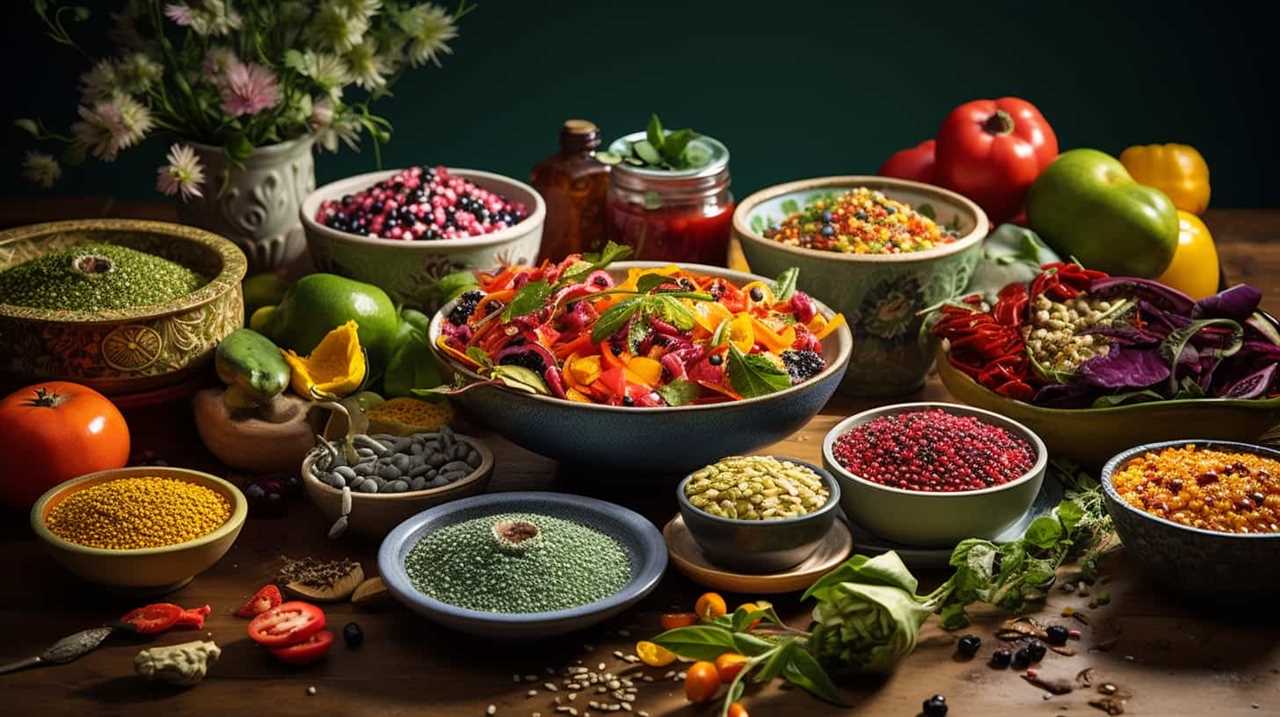
Can Chia Jam Be Used as a Filling in Gluten-Free Baked Goods?
Yes, chia jam can be used as a filling in gluten-free baked goods. We’ve found several chia jam recipes that are perfect for adding flavor and moisture to cakes, muffins, and cookies. It’s a creative way to incorporate chia seeds into gluten-free baking.
How Can Chia Seeds Be Used as a Substitute for Xanthan Gum in Gluten-Free Baking?
Chia seeds can be a great alternative to xanthan gum in gluten-free baking. They provide similar binding properties and can help improve the texture of baked goods. Plus, they offer additional nutritional benefits.
Conclusion
Incorporating chia seeds into gluten-free baking can add nutritional value, enhance texture, and provide alternative ingredients.
From using chia seed flour and chia gel as binding agents to creating chia pudding for moistness, there are numerous ways to incorporate chia seeds into your gluten-free recipes.
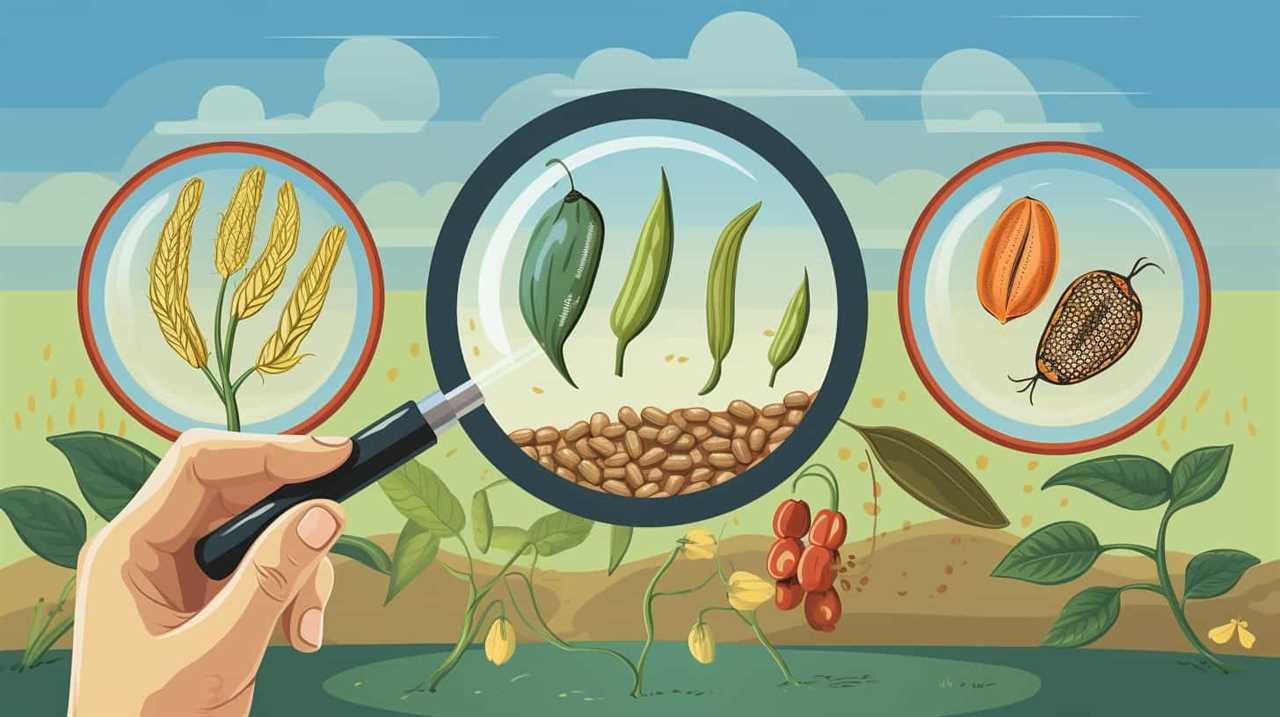
So why not try adding these tiny powerhouses of nutrition to your next batch of gluten-free baked goods?
Who knows, you might just discover a new favorite ingredient!




